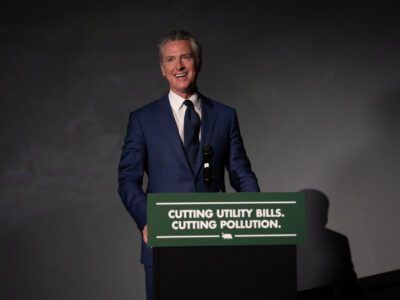Guest Blogger David Schraub: Vermont Environmentalists File FTC Challenge over “Double-Counting” RECs
David Schraub is the Darling Foundation Fellow in Public Law at the University of California Berkeley School of Law.
Represented by Patrick A. Parenteau and Douglas A. Ruley of the Vermont Law School’s Environmental and Natural Resources Law Clinic, four Vermont residents have petitioned the FTC to investigate alleged misleading marketing practices by Green Mountain Power regarding their provision of renewable energy. The petition contends that Green Mountain has engaged in misleading practices by marketing their power to Vermont consumers as “renewable” even while selling the renewable attributes of the power to other utilities (who in turn use them to supplement the amount of their own electricity they can claim as “renewable”).
The complaint centers on Green Mountain’s use and sale of Renewable Energy Credits (RECs). RECs represent the renewable attributes of renewable energy production, and can be disaggregated and traded separate from their associated electricity. RECs are often purchased by utilities who face state-mandated Renewable Portfolio Standards which require that a certain amount of the electricity they produce or sell be renewable, or by consumers who wish to off-set their “dirty” energy usage. Because the purchaser of a REC is able to claim the power’s green attributes, virtually all industry observers agree that selling a REC nullifies the renewable quality of the original electricity. That is to say, if a utility produces one megawatt/hour of renewable electricity which it sells to consumer A, but it sells the associated REC to consumer B, it cannot claim to have provided A with renewable energy. Consequently, many states (but not Vermont) have rules which forbid applying a REC to more than one purpose.
The FTC waded into this debate in 2012 with the release of its non-binding “Green Guides” (published at 16 C.F.R. part 260). While the Commission declined to provide specific guidance on the case of “generation claims by power producers who generate renewable energy as a substantial portion of their business,” the final guidelines did state that “[i]f a marketer generates renewable electricity but sells renewable energy certificates for all of that electricity, it would be deceptive for the marketer to represent, directly or by implication, that it uses renewable energy.” 16 C.F.R. § 260.15(d). The Commission stated that its focus was on manufacturers who generate their own renewable power (for example, by rooftop solar panels), but the Vermont petition offers the FTC an opportunity to clarify the application of the guides to renewable energy generation by utilities and standardize the already-prevalent norm against “double-counting” a single REC.
While most of the attention on this case has understandably focused on how it will impact renewable energy marketing practices, the petition may also raise a potentially larger issue regarding the federal regulation of retail electricity monopolies. While a minority of states in the 1990s and early 2000s deregulated their retail electricity markets and opened the doors to competition by multiple providers, most states (including Vermont) have retained the traditional model of a single monopoly utility with exclusive rights to serve a particular geographic region. The petition indicates that Green Mountain Power believes it is not subject to the FTC jurisdiction because it does not “market” to its (captive) consumers. After all, Vermont electricity customers have no other choice regarding where to buy electricity, so what exactly could Green Mountain Power be “marketing”? If this argument is accepted, it would sharply constrain the ability of the federal government to regulate misleading claims by electricity providers in the majority of states in which consumers lack retail electricity choice.







Reader Comments